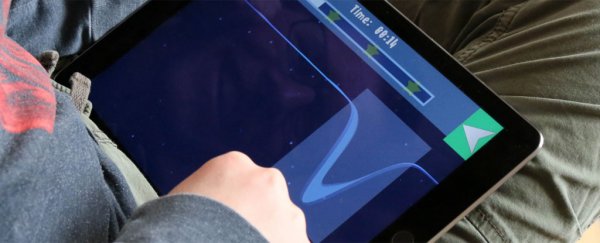If the recent headlines that a Google supercomputer pretty much obliterated a South Korean Go champion had you feeling blue about humanity's gaming prospects in the face of indomitable artificial intelligence (AI), here's your pick-me-up for the weekend.
Danish scientists have teamed up with gamers to help them rethink how we build quantum computers – something we haven't managed to do yet, despite what Google tells you. The plan is to have gamers play a bunch of video games that can help machines learn how humans act, think, and play intuitively, which will enable the researchers to better understand how quantum calculations actually work.
And the coolest thing about this project is you can actually take part yourself. The flagship game, Quantum Moves, is available for Windows and Mac, and there are also mobile versions for iOS and Android.
As far as citizen science goes, this is one of the most accessible platforms we've seen, but how does playing video games translate into quantum physics exactly?
Basically, in Quantum Moves, the challenge for the player is to manipulate a well of water on a movable line, and carry a volume of sloshing liquid from one spot to another.
Okay, so it's not exactly Skyrim, but the whole game is an interactive 2D metaphor for the challenge of being able to grab and move a specific atom with a laser in a quantum computer. Learning how to do this – especially quickly and efficiently – is something computers aren't especially good at.
The hypothesis is that by studying how people play the game, the machines will be able to get better at physics challenges that humans solve with intuition and guesswork – as opposed to relying on purely numerical calculations, which can be inefficient and slow in these kinds of circumstances.
"The players solve a very complex problem by creating simple strategies. Where a computer goes through all available options, players automatically search for a solution that intuitively feels right," said physicist Jacob Sherson from Aarhus University.
"Through our analysis we found that there are common features in the players' solutions, providing a glimpse into the shared intuition of humanity," he added. "If we can teach computers to recognise these good solutions, calculations will be much faster. In a sense we are downloading our common intuition to the computer."
The scientists have detailed their gamification platform and how it's contributing to quantum physics in Nature, but the research and the game are still ongoing. They now want people to take part in their 'April challenge' to see how many times Quantum Moves gets played this month (it's currently standing at over 500,000 runs).
It remains to be seen how valuable gamer input ultimately ends up being in Quantum Moves, but as it stands, games and our addiction to playing them are a massive potential resource for science. If we're really playing 3 billion hours of games a week, surely all that effort, skill, and brainpower could end up being leveraged for something beyond personal thrills?
It's something scientists have relied upon before. In 2011, researchers enlisted gamers to help them figure out part of the structure of an AIDS-like virus that affects monkeys. By playing a kind of 3D puzzle game called Foldit, gamers solved in just weeks a problem that had stumped scientists for years.
Other player-focused science projects have included a real-life planet-hunting astronomy game, a search for arable land based on satellite imagery, and a brain-mapping game where players help scientists identify connections between neurons.
If the same approach works for Quantum Moves, it could help anybody contribute to developing quantum computers – a decidedly heady field of academic science in which most people would probably otherwise never feel included.
"Gamers are used to experimenting with possibilities that go beyond the classical laws of physics," writes quantum physicist Sabrina Maniscalco from the University of Turku in Finland, who wasn't involved with the study, in a commentary in Nature. "Perhaps this ability to think outside the box allows them to make the creative leap necessary to tackle quantum problems."

